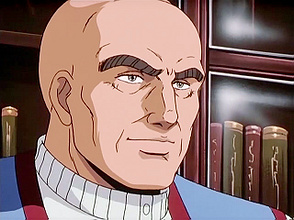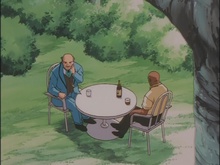Adrian Rubinsky
From Gineipaedia, the Legend of Galactic Heroes wiki
 Adrian Rubinsky (800 UC (2 NIC / 491 IC / 3600 CE)) | |
| Gender: | Male |
| Affiliation: | Dominion of Fezzan |
| Occupation: | Landesherr (lit. 'Land lord') |
| Status: | Deceased |
| Died: | 13 June 801 UC (3 NIC / 492 IC / 3601 CE) |
| Played by: | Kobayashi Kiyoshi |
Adrian Rubinsky (Japanese: アドリアン・ルビンスキー) was a Fezzani statesman and the fifth Landesherr of the Dominion of Fezzan, nicknamed the "Black Fox of Fezzan" for his scheming nature and skilful manipulation of galactic politics. A cunning and ambitious leader, Adrian Rubinsky worked behind the scenes to manipulate both the Free Planets Alliance and the Galactic Empire to further both his own interests, and those of the Terraist Church. Rubinsky was thus responsible for numerous ventures, including providing intelligence to both the Alliance and the Empire on each other's military movements, instigating the inquiry against Admiral Yang Wen-li and pitching the idea for the mobilization of Geiersburg Fortress, as well as arranging the kidnapping of Emperor Erwin Josef II and the establishment of the "legitimate" Imperial government-in-exile.
However, he ultimately betrayed his Terraist masters, mainly seeking to secure as much power for himself as possible. The Black Fox initially wanted Fezzan to take control of the economy of the New Galactic Empire after Reinhard von Lohengramm succeeded in unifying the galaxy, but as the future Kaiser ended up annexing the Dominion before that could happen, Rubinsky sought to sabotage his reign using Fezzani influence while in hiding. The former Fezzani Landesherr ended up succumbing to illness before his ambitious schemes came to fruition.
Contents |
Taking the reins of power
Little is known of Adrian Rubinsky's background other than that he became the Landesherr of the Dominion of Fezzan after his predecessor, Walenkov, was assassinated by the Terraist Church for wanting to act independently of them. It is also known that at some point Rubinsky had entered an affair which resulted in the birth of a son, Rupert Kesserling, and that he later met another woman with whom he had a relationship, Dominique Saint-Pierré, around the time he was a senior secretary in the administration of the previous Landesherr. As with every other Fezzani head of government, Rubinsky was one of the few who was aware of the secret that, while he and every other Fezzani was technically a subject of the Galactic Emperor, the Dominion existed essentially as a public face for the Terraist Church, though by 796 UC (487 IC / 3596 CE) he had his own ambitions beyond serving the Terraist movement. In his position as the leader of Fezzan, Rubinsky gained a reputation for his scheming and plotting, becoming the so-called "Black Fox of Fezzan" as even the acting Imperial prime minister Klaus von Lichtenlade noted. (Encyclopaedia Die Legende der Sternhelden; LOGH: 'New Trends', 'Determination and Ambition', 'Fezzan Occupied', 'Cosmic Mosaic')
Rubinsky monitored the rise of both Reinhard von Lohengramm and later Yang Wen-li in the Galactic Empire and the Free Planets Alliance, respectively. He had watched over their actions and plotted accordingly since around the time of the Battle of Astarte (it was through Fezzan that the Alliance government found out about the Imperial plans that would lead to Astarte). Around 796 UC (487 IC / 3596 CE) he also supplied the rogue nobleman Maximilian von Castrop with the Artemis Necklace defense system, which led to the short-lived Castrop Rebellion, but his most significant action was informing the Imperial high commissioner on Fezzan Jochen von Remscheid on the decision by the Alliance government to launch an invasion of the Imperial Territory. Remscheid reported this information back to Odin, where Kaiser Friedrich IV appointed Reinhard von Lohengramm to take command of the defense of the Empire against the impending Alliance attack. (Overture to a New War, LOGH: 'In the Eternal Night', 'The Battle of Astarte', 'The Castrop Rebellion', 'Invasion of the Imperial Territory')
The Black Fox

The failure of the Alliance invasion with the loss of twenty million troops began a period of internal struggle in both countries, as Kaiser Friedrich IV suddenly died and the Royal Sanford Administration fell. Because Emperor Friedrich had died without a designated heir, Rubinsky correctly predicted that the child Erwin Josef—son of the deceased Crown Prince Ludwig—would be crowned as the next sovereign by acting premier Lichtenlade. That was because, the Fezzani Landesherr stated, the boy had no influential parentage and thus would be easy to control, while the other two candidates were scions of the great Imperial aristocratic houses. Meanwhile in the Alliance, Job Trunicht took over as Supreme Council Chairman with the fall of Sanford in the aftermath of the failed invasion. Rubinsky observed those events from afar as the Empire descended into an armed conflict between the alliance of Reinhard von Lohengramm and Klaus von Lichtenlade, backing the young Kaiser Erwin Josef II, and an axis of the powerful high nobles, led by Duke Otto von Braunschweig. The Alliance also followed as Reinhard had smuggled a former Alliance admiral back into the country who instigated a military coup against the unpopular government, in order to prevent them from intervening in his struggle against the nobility. (LOGH: 'New Trends', 'Before the Storm', 'The Lippstadt Conspiracy', 'The Yang Fleet Goes Out')
By the time these events had played out and ended in late 797 UC (488 IC / 3597 CE), Rubinsky noted that the Alliance had been severely weakened by internal strife while the Empire was strengthened by its civil war. Reinhard von Lohengramm purged the nobles and began reforming the Imperial government, while the Alliance grew more corrupt under the restored Trunicht administration and the military was crippled by its losses of the past two years. Thus, as the Fezzani leader told Terraist Bishop Degsby, he planned to support the Empire under Reinhard von Lohengramm (now the prime minister) and assist the young Imperial dictator in conquering the Alliance. At that point Fezzan would take control over the country by having him assassinated and control every aspect of the New Reich's economy. What he did not tell Degsby was that he didn't believe that the proposed theocracy would be an effective form of government, so he intended to use the Imperial military to suppress & destroy the Church of Terra once the ruling systems of the FPA and the Imperial government had become subservient to the rule of Fezzan.
Around the same time he sent his personal secretary Nicholas Boltik to Odin as Fezzan's ambassador in the Empire, replacing him with the young but talented college graduate Rupert Kesserling. Rubinsky was aware that he was his son. (LOGH: 'First Battle', 'One Narrow Thread', 'Determination and Ambition')
As part of this plan, in the early months of 798 UC (489 IC / 3598 CE) Rubinsky wanted to ensure that the Alliance and Empire would not sign a peace treaty now that Reinhard had overthrown the despotic Goldenbaum Dynasty and would remain at war. Thus he hatched another scheme. As the first phase, he had his son Kesserling speak with Alliance ambassador Henslow, suggesting that Fezzan could no longer continue granting the country loans as long as they remained unstable. He hinted that Fezzan was concerned about the potential ambitions of Admiral Yang Wen-li to overthrow the Trunicht administration. Henslow reported this information back to the government on Heinessen, where Trunicht took this claim seriously—as Rubinsky intended. Yang was summoned to the capital for an inquiry into his loyalty, while Kesserling made sure that documents for a plan to put warp engines on Geiersburg Fortress and use it to attack Iserlohn Fortress made their way to the Imperial admiralty's science and technology inspector general, Admiral Anton Hilmer von Schaft. The plan was accepted by Reinhard and Geiersburg Fortress was successful mobilized with the usage of these engines, in March 798 UC (489 IC / 3598 CE). It subsequently entered the Iserlohn Corridor on April 10, beginning the Eighth Battle of Iserlohn. Even as the Geiersburg deployment was playing out, Rubinsky had moved on to the next stage of the plan. (LOGH: 'First Battle', 'Portraits', 'One Narrow Thread', 'Lost Things')
Around this time, Rubinsky also found out that his son was a very ambitious schemer in his own right and planned to overthrow his father to seize his position. He was not intimidated, however, and continued to work with him to implement their plans. (LOGH: 'Determination and Ambition')
Geiersburg Fortress failed to destroy Iserlohn, but Rubinsky had Kesserling speak with former Imperial Civil War veterans who had fought for the high nobility, including Alfred von Landsberg and Leopold Schumacher, who were hired to kidnap the child emperor and escape to the Alliance, where they would established a "legitimate" government-in-exile. Next Rubinsky's son spoke with Jochen von Remscheid, convincing him to be the prime minister of this new government. Landsburg and Schumacher successfully kidnapped the emperor in the summer of 798 UC (489 IC / 3598 CE), although unbeknownst to Rubinsky and Kesserling back on Fezzan, Reinhard von Lohengramm had deduced their entire plan. He spoke with ambassador Boltik, who told him the exact details, and made a deal to cooperate with them and use the kidnapping of the emperor as the casus belli to invade the Alliance. What Reinhard did not mention was that he intended to fully annex the Dominion into the Empire and use the Fezzan Corridor to invade the Alliance. Rubinsky allowed the nobles to smuggle Erwin Josef II through the Fezzan Corridor to the Alliance, where he used Fezzan's influence to ensure that the Alliance government accepted the exiled court. (LOGH: 'Lost Things', 'The Return', 'Determination and Ambition', 'Thunder', 'The Abduction of the Young Emperor')
The formation of this government-in-exile was followed by a declaration of war on the Alliance by Reinhard, as Rubinsky intended. However, he had no idea that Reinhard intended to prelude his invasion of the Alliance with the Imperial annexation of the Dominion of Fezzan. In December 798 UC (489 IC / 3598 CE), the Imperial Fleet entered the Fezzan Corridor and descended on the planet, forcing the Black Fox to acknowledge the abilities of the "blond brat" for outsmarting him. That evening, as Imperial troops were landing throughout Fezzan, Rubinsky was confronted by his son, who tried to use that opportunity to shoot him. However, Kesserling was killed by the Landesherr's bodyguards before he could carry out his ambition. Shortly afterwards Rubinsky departed for the country estate of Dominique Saint-Pierré (who had spoken with Kesserling and informed Rubinsky of his intent to kill him). There he would evade Imperial authorities as he planned his next move against Reinhard. (LOGH: 'Operation: Ragnarök', 'Invitation to a Requiem', 'Fezzan Occupied')
Life as a fugitive

After the annexation of Fezzan, Rubinsky spent years in hiding throughout the Fezzani countryside, managing to evade Imperial authorities that were now searching for him. The former Fezzani head of government used his extensive hidden connections and resources to launch attacks upon Kaiser Reinhard's new Empire. Among those schemes was being involved with the former Kaiser that he organized the kidnapping of, Erwin Josef II, and his deranged caretaker Alfred von Landsberg—although the child later disappeared. Another plan revolved around supporting the ambitions of Heydrich Lang, the head of Reinhard's Internal Security Department, and encourage rebellion from Fleet Admiral Oskar von Reuenthal, in order to splinter the young Empire. However, he was suffering from a malignant brain tumour and by tracing medicines for this Paul von Oberstein was able to locate and arrest him on Heinessen. At this time Rubinsky was believed to have less than a year to live, however he refused food and eventually disconnected his own life support. It was only then discovered that he had planted bombs across Heinessenopolis and that the termination of his brain waves activated a transmitter hidden in his body, triggering them. Thirty percent of the city was destroyed by the resultant fires, killing over five thousand people and injuring over half a million. (LOGH: 'To El Facil', 'The Long Road Ahead', 'Eve of the Festival', 'The Order to Transfer the Capital', 'Burgeoning', 'Endless Requiem', 'Cosmic Mosaic', 'Planet of Confusion')
Personal life
Rubinsky had an illegitimate son, Rupert Kesserling, who was killed attempting to overthrow him. He was also in a longstanding relationship with Dominique Saint-Pierré, although she refused to bear him another son after Kesserling's death.
He also appeared to be well versed in history and philosophy, often discussing it with his son and other colleagues.
Appendices
Appearances
- LOGH:
- 'In the Eternal Night' (first appearance)
- 'The Battle of Astarte'
- 'The Castrop Rebellion'
- 'Invasion of the Imperial Territory'
- 'Liberation of the Frontier Zone'
- 'New Trends'
- 'The Yang Fleet Goes Out'
- 'Bloodshed in Space'
- 'Farewell, Distant Memories'
- 'First Battle'
- 'Portraits'
- 'One Narrow Thread'
- 'Lost Things'
- 'Determination and Ambition'
- 'The Arrow Is Released'
- 'Operation: Ragnarök'
- 'Invitation to a Requiem'
- 'The Sounding of Gjallarhorn'
- 'Fezzan Occupied'
- 'Seeking a Free Universe'
- 'To El Facil'
- 'The Long Road Ahead'
- 'Eve of the Festival'
- 'To the Windy Corridor'
- 'The Order to Transfer the Capital'
- 'Burgeoning'
- 'Endless Requiem'
- 'Cosmic Mosaic'
- 'Planet of Confusion'
- 'The Golden Lion Flag Loses Its Lustre' (death)
- Overture to a New War
Memorable quotes
- "Historically speaking, there is no nation which is destroyed merely by attacks from an external enemy. This thing, called a nation, starts to rot from the top down instead. There is not one exception."
- "While they extol democracy, in reality, by ignoring laws and rules, they reduce it to a mere formality. It is a cunning but risky way of doing things. Because if the people in power do not respect their own laws, the standards of society itself slacken."
- "It's just like the incompetent Alliance politicians to act complacent."
- "He [Rupert Kesserling] wasn't an observer of actors, but only saw his ideal illusions of them."
Background information
Adrian is a name of Latin origin that was named after a river that connected to the Adriatic Sea. The origin of the name Rubinsky is less clear, but was used throughout Eastern Europe.